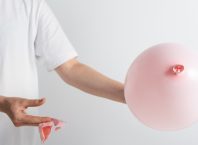Table of Contents
Most people can relate to the feeling of having mood swings from time to time.
After coming home from a hard day at work, something small might completely ruin your disposition. Perhaps you’ve been down lately after a minor break up. After a few days of moping, you snap out of it, suddenly back to your old self.
But, for the 2.8% of Americans who have bipolar disorder, these changes in moods are much more severe. The highs are very high, and the lows very low.
People with bipolar disorder experience periods of depression accompanied by periods of extremely high energy or mania. It can cause them to act in self-destructive ways that they normally wouldn’t. Day-to-day life can become difficult and interpersonal relationships suffer.

Does that sound familiar to you? If you’ve been asking yourself lately, “do I have bipolar disorder” read on to learn about 10 warning signs.
-
Depression
Bipolar disorder was at one time referred to as “manic depression.” Meaning, bouts of depression are a hallmark of the mental illness.
With this disorder, depression can present itself in different ways. Some people may experience long stretches of sadness or despondency. Others may feel depression less frequently.
People with bipolar disorder can seem like any other depressed person. Having trouble getting out of bed, feelings of hopelessness, etc.
However, regular anti-depressants likely won’t help someone who is actually experiencing bipolar-related depression. They need treatment that is tailored towards the whole disorder, not just the depression.
-
Euphoria
The depressive aspects of bipolar disorder are obviously very unpleasant. But, the second warning sign can be exactly the opposite. Simply put, bipolar is characterized by emotional highs and lows that swing back and forth.
If you’re experiencing extreme happiness or euphoria, that can be an indication you’re bipolar. This is called “hypomania.”
Sometimes the highs of bipolar can mean a manic break from reality. But, during hypomania, the person has not experienced that break. Instead, they may feel a huge burst of happiness, energy, and creativity.
Hypomania can feel great at the moment, but it often causes one to act in impulsive ways they wouldn’t otherwise.
-
Moody Temperament
As mentioned above, a person with bipolar disorder can swing back and forth between highs and lows. But sometimes, the person can be experiencing both mania and depression at the same time.
When this happens, people can feel irritable or angry. People who experience this “mixed mania” are often hard to diagnose.
Everyone gets moody or irritable from time to time. However, if this temperament is chronic and affects your relationships, it could be a sign of bipolar disorder.
-
Short Attention Span
During a hypomanic episode, a person is likely to come up with a lot of ideas and plans. With this huge burst of energy, they’re motivated to feverishly get to work.
However, at this time, the brain is working a mile a minute. It’s not too long before another idea comes up that they want to pursue. The previous endeavor is left in the dust.
Lots of people can be a little flaky, starting projects they never finish. But, again, when this becomes chronic, it could be a warning sign.
-
Extremely Talkative
One very common sign of bipolar disorder is something called “pressured speech.” Their minds are moving so rapidly, their words can barely keep up with their thoughts.
It’s not a matter of being a little talkative. Instead, a bipolar person will speak rapidly, jumping from subject to subject.
Being in conversation with a person experiencing pressured speech feels like they’re talking “at” you. It’s difficult to get a word in, and if you do, they will frequently interrupt or talk over you.
-
Drug and Alcohol Abuse
Drugs and alcohol are commonly used by people who are suffering from an untreated mental illness. Without prescribed medication, it’s an easy way to numb the emotional distress they’re feeling.
For a bipolar person, substances may be used to self-medicate the sadness of a depression. During a hypomanic episode, people engage in reckless behavior like going on a substance bender. They may also use alcohol or certain drugs to try and calm down their excessive energy.
-
Sexual Promiscuity
Sexual promiscuity is another sign that might point to someone going through a hypomanic episode.
Having many sexual partners doesn’t have to indicate any kind of mental illness. But, during this “high” period, having intercourse might become compulsive.
How can you tell if this promiscuity is a signal of something serious? A good indication is if it is frequently unprotected or puts you in potentially dangerous situations. Another sign is if after you come down from the hypomania, you seriously regret the encounters.
-
Sleep Problems
Both depression and hypomania are very often accompanied by sleep issues.
Like other depressed people, you might feel exhausted all the time or spend whole days in bed.
During a manic phase, functioning on little to no sleep is easy. These periods of lack of sleep are detrimental, often making bipolar symptoms worse.
-
Compulsive Spending Issues
Bipolar mania often shows itself through impulsive behavior. Compulsive spending or gambling problems are common.
Bipolar disorder is on a spectrum. Some people experience more extreme symptoms than others. Compulsive spending to some can mean buying a pair of shoes you don’t need and can’t afford. To others, it might mean gambling your home away.
-
Inflated Ego
Not everyone with an inflated ego has bipolar disorder. Some people are just jerks! But this trait, paired with some of the other warning signs could point towards a diagnosis.
This isn’t a matter of being a little over-confident. People with bipolar disorder may feel something closer to delusions of grandeur. As if you’re god-like or truly invincible.
Do I Have Bipolar? Only a Doctor Can Tell You That
If you’ve been asking yourself “do I have bipolar disorder” it’s probably time to seek out a professional. Reading about the condition can offer some clarity, but only a doctor can diagnose you properly.
Looking for a psychologist who can discuss these concerns with you? Contact us to schedule an appointment with Dr. Blair today.















